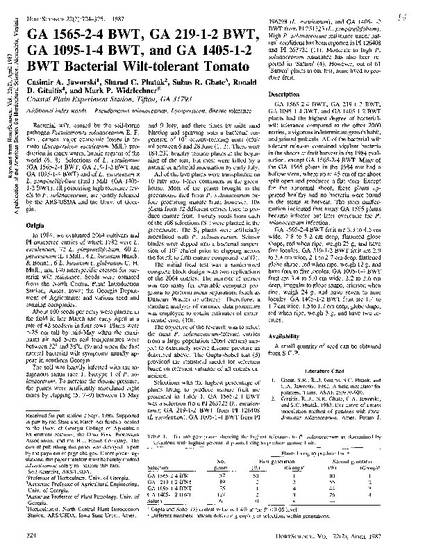
Article
GA 1565-2-4 BWT, GA 219-1-2 BWT, GA 1095-1-4 BWT, and GA 1405-1-2 BWT Bacterial Wilt-tolerant Tomato
HortScience
Document Type
Article
Disciplines
Publication Version
Published Version
Publication Date
4-1-1987
Abstract
Bacterial wilt, caused by the soil-borne pathogen Pseudomonas solanacearum E. F. Sm., causes major economic losses in tomato (Lycopersicon esculentum Mill.) production in many warm, humid regions of the world (6, 8). Selections of L. esculentum (GA 1565-2-4 BWT, GA 219-1-2 BWT and GA 1095-1-4 BWT) and of L. esculentum x L. pimpinellifolium (Jusl.) Mill. (GA 1405- 1-2 BWT), all possessing high tolerance levels to P. solanacearum, are jointly released by the ARS/USDA and the Univ. of Georgia.
Rights
Works produced by employees of the U.S. Government as part of their official duties are not copyrighted within the U.S. The content of this document is not copyrighted.
Language
en
File Format
application/pdf
Citation Information
Casimir A. Jaworski, Sharad C. Phatak, Suhas R. Ghate, Ronald D. Gitaitis, et al.. "GA 1565-2-4 BWT, GA 219-1-2 BWT, GA 1095-1-4 BWT, and GA 1405-1-2 BWT Bacterial Wilt-tolerant Tomato" HortScience Vol. 22 Iss. 2 (1987) p. 324 - 325 Available at: http://works.bepress.com/mark_widrlechner/85/

This article is from HortScience 22 (1987): 324.